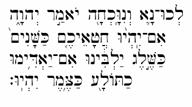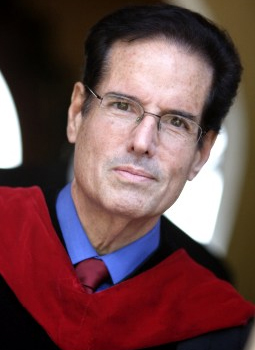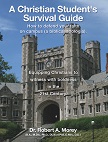Archives Posts
A Simple Fallacy
December 10th, 2007 by Dr. Robert Morey
Natural theologians constantly commit one of the simplest errors. They take an idealized and romantic modern concept of human "Reason," that developed during the Renaissance, particularly during the French Revolution, and insert it back into biblical times and even attempt to insert it into biblical texts. But is it possible that ancient writers, most of whom died thousands of years before the Renaissance, knew of and believed in modern Renaissance romantic ideals of an exalted and abstract "Reason," before whom all must bow, including God?
Ideas have a history that we cannot ignore. We can trace when, where, and through whom an idea first appeared in history. Newton's idea of the "law of gravity" and Einstein's "theory of relativity" are good examples of this.
The attempt to take a modern idea and push it back thousands of years before it appeared in history is a grave mistake. If someone claimed that Einstein's theory of relativity was taught in the Bible, they would be grossly mistaken. But this is exactly what those who believe in Natural Theology, Natural Law, and Philosophy do all the time.
When they use Renaissance idiomatic phrases such as "before the Bar of Reason," "the demands of Reason," etc., this is a dead give away that they are guilty of this fundamental error. This phrase "before the Bar of Reason" requires an explanation today as public education no longer teaches the rudiments of European history.
The French Natural Philosophers had abstracted, idealized, romanticized, and then absolutized human reason into an all-seeing, all-knowing, omnipresent, omnipotent, infallible, "Reason." They took man's limited and faulty ability to think about issues and then came to a conclusion and elevated it into the Origin of truth, justice, morals, meaning, and beauty. "Reason" was the measure of all things, including God. They had replaced "God" with "Reason." During the French Revolution, people were dragged before the "bar" or bench of a rationalist judge who proclaimed their guilty verdict in the name of "Reason."
This is one of the fundamental methodological errors of J.P. Moreland, Norman Geisler, William lane Craig, Greg Koukl, Francis Beckwith, et al. They cite such texts as Isa. 1:18 ("Let us reason together") and Acts 17:2 ("Paul...reasoned with them"), to prove (sic) that the modern Renaissance concept of "Reason" can be found in the Bible. They assume that the mere presence of the verb "reason" in such passages is sufficient proof that the
authors of Scripture knew of and believed in the Renaissance concept of the noun
"Reason."
First, it is outrageous for them to insert a modern idea into ancient biblical times and texts.
Second, none of them even attempt to do any exegesis of the texts they cite. It would appear that they never bothered to check the Hebrew or Greek. They cite texts much like Jehovah's Witnesses.
Third, even if we pretended, in a moment of insanity, that modern Renaissance ideas like "Reason" could magically appear in ancient biblical times and texts, this would still require hard exegetical work to support it.
To test the vaunted claims of Natural Theologians that their modern ideas of "Reason" can be found in the Bible, you must take several steps.
Step One: You must identify all the Hebrew and Greek words that were translated "reason" in English translations. What will you find? There were nine different Hebrew words and eleven different Greek words that were sometimes translated as "reason" by some versions some of the time.
Step Two: You must analyze these Hebrew and Greek words grammatically. When you do, you will first discover that, for the most part, they are usually verbs, not nouns. This is significant. Natural theologians appeal to some "thing" called "Reason," which is supposedly the Origin of truth and morals. But there is no Hebrew or Greek noun in Scripture that corresponds to the Renaissance noun "Reason."
Step Three: Since there are over one hundred biblical passages where the word "reason" appears in some English versions, you have to exegete each passage in its context. When you do, you will find that most versions are in error to use the word "reason."
Nearly all the Hebrew and Greek words translated "reason" have nothing to do with human "reason" per se but are simple conjunctions. They are grammatical, not anthropological, in nature.
Old Testament Vocabulary
![]()
There is only one Hebrew word of interest: ![]() . This verb means to rebuke, admonish, argue or discuss. In a few places, it is used in a judicial sense of a judge rendering a verdict. It is a verb and not a noun and thus never appears in the Bible with the meaning of "Reason."
. This verb means to rebuke, admonish, argue or discuss. In a few places, it is used in a judicial sense of a judge rendering a verdict. It is a verb and not a noun and thus never appears in the Bible with the meaning of "Reason."
Isa. 1:18 has always been quoted by Naturalists to prove (sic) that the Renaissance concept of "Reason" is in the Bible. What can be said about this text?
![]() First, the word in this passage has nothing to do with an anthropological or metaphysical concept of "Reason." I translated it as follows:
First, the word in this passage has nothing to do with an anthropological or metaphysical concept of "Reason." I translated it as follows:
"Come on now!
And let us sit down and discuss your sins,"
says YHWH.
"Although your sins are scarlet in color; They can be as white as snow.
Although they are as red as crimson, They will be white like wool."

God invites His people to sit down and "discuss" a certain issue with Him. The word "reason" is a verb and refers to the activity of discussing or talking. It is not a noun, i.e. the Renaissance "Reason." What was the issue that they were invited to discuss? Was it the existence of God? No. Was it God and evil? No.
The passage is clear that the issue in focus was man's sin, not God's existence. Therefore, any use of this passage to justify Natural theology and its modern concept of "Reason" is erroneous.
But what was the basis of the discussion between God and man? According to Isa. 1:10, the basis of the discussion is "the Word of YHWH," special revelation, not human reason. To use this passage (Isa. 1:18) to prove the Renaissance concept of "Reason" as the basis of the discussion is erroneous.
When we look to the New Testament, most of the Greek words translated "reason" have nothing to do with human reason per se. Once again they are grammatical, and not anthropological or metaphysical in nature.
New Testament Vocabulary

![]() There is one word that appears in the Greek Testament that is of interest. It appears with different prefixes
There is one word that appears in the Greek Testament that is of interest. It appears with different prefixes ![]() .
.
![]() usually means to discuss, talk about, compute in your mind or with others. The discussion can be a dialogue as well as a monologue. It can even be a group discussion. The important point is that this Greek verb cannot, by any stretch of the imagination, be twisted to refer to the modern Renaissance concept of "Reason."
usually means to discuss, talk about, compute in your mind or with others. The discussion can be a dialogue as well as a monologue. It can even be a group discussion. The important point is that this Greek verb cannot, by any stretch of the imagination, be twisted to refer to the modern Renaissance concept of "Reason."
One last comment is in order. Some Natural theologians have argued that if we reject the Renaissance abstract concept of "Reason," we are denying that man can "reason" from point A to point B. But this argument is an example of the fallacy of equivocation.
To reject an abstract idealized "Reason," i.e. Rationalism, is not the same thing as rejecting man's capacity to "reason." The biblical authors viewed man's capacity to think through issues and to come a conclusion as a reflection of the image of God. While they believed in "reasoning," this does not mean they knew or believed in "Reason."
Another Natural theologian objected to our use of the lower case "r" and the capital letter "R." But his objection fell flat when we asked, "If the use of capital and lower case letters bothers you, does the distinction between the capital "G" and the lower case "g" in "god" and "God" bother you as well?"
In conclusion, the authors of Scripture did not know of or believe in the modern
Renaissance concept of an abstract absolute "Reason." Any attempt is to read that
concept back into the Bible is sheer ignorance at best and gross deception at worse. Thus, Natural Theology is a total sham.
Filed under Apologetics having 53 Comments »






































